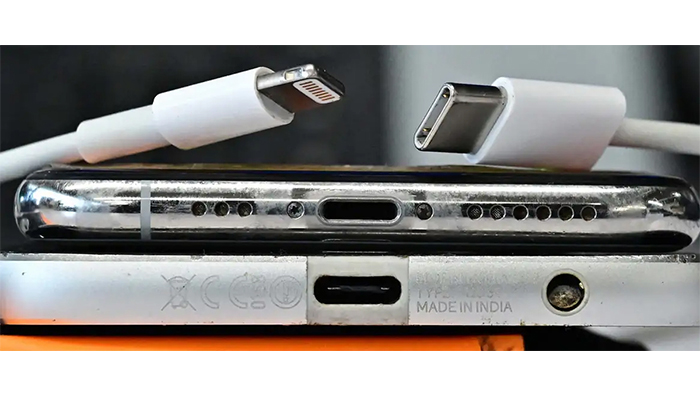
New Delhi: India is set to require that new smartphones, wearables and tablets feature universal charging ports by June 2025, in a move aimed at benefiting consumers and cutting down massive amounts of electronic waste.
The streamlined charging port rule follows the example of the European Union, which in June 2022 gave Apple until autumn 2024 to make changes to its charging ports.
According to a recent report on electronic waste management in India by Assocham, a nongovernmental trade organisation, India is estimated to have generated 5 million tons of e-waste in 2021, ranking behind only China and the US.
Rajan Vasa, the chairman of the RV group, an electronics industry consultancy, told DW that adopting a uniform charging port would serve the interests of consumer welfare and the prevention of avoidable e-waste.
"A shift towards universal chargers would bring down the cost of chargers" and reduce product packaging, he said.
Apple lobbying for delay
However, Apple has informed the Indian government about potential disruptions to its local production targets if New Delhi proceeds with adopting the mandate for universal charging ports on existing iPhone models, according to a report by Reuters.
The report said Apple was actively lobbying for an exemption or a delay in the implementation of the rule and had asked Indian officials to exempt existing iPhone models, warning it would otherwise struggle to meet production targets.
"There is still consultation going on the issue of mandating universal charging ports for all smartphones in the country. We have sought views from all stakeholders, and Apple has raised concerns ... We will investigate the matter," said India's minister of state for electronics and information technology, Rajeev Chandrasekhar, in a recent interview with Indian media.
Most manufacturers, including Samsung, have agreed to comply with the rule.
Pranav Pandya, the chairman of the GESIA IT Association, an information technology interest group, told DW that if an exemption was not granted, Apple had "indicated that there may be a need for an additional 18 months" to meet production goals.
"The company has emphasized the importance of a natural transition period to align with product design timelines," he said."India is important for Apple and vice versa," Pandya added. "We are of the opinion that both sides will find a win-win resolution," he said.
Apple's production plans in India
Industry insiders say that India is at the center of Apple's plans to diversify production away from China.
Within the next three years, the tech giant reportedly aims to start assembling more than 50 million iPhones annually in India.
India is the second-biggest mobile phone-producing country in the world after China, expanding by more than 20% in this regard between 2014 and 2022, according to a report by technology market research firm Counterpoint.
Shipments of domestically manufactured mobile phones exceeded 2 billion during this time, the report added. Mobile phones manufactured in India had a market share of 19 % in 2014 and saw a jump to 98 % in 2022.
The India Cellular and Electronics Association (ICEA), an electronics industry body, said the sector was "completely aligned" with the government in implementing a uniform charging port regulation in India to reduce e-waste and promote ease of living for consumers.
"The mobile phone industry has already adopted the Type-C USB port for charging and 100% of the new models launched and sold in India are with Type-C," Pankaj Mohindroo, the chairman of ICEA told DW.
Most Android smartphones already come with a USB Type-C port, with only a handful requiring a micro-USB now.
Older model Apple iPhones still feature the company's proprietary lightning port, which is only compatible with Apple devices.
In September 2023, the Apple iPhone 15 was the first model to feature a USB-C charging port.
Mohindroo added that the ICEA was working with the Indian government to enable a smooth transition for all electronics to the USB-C ports.